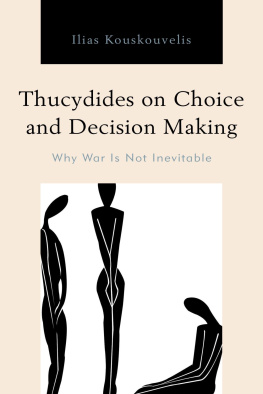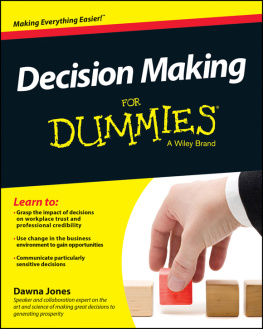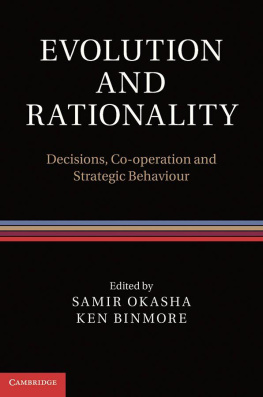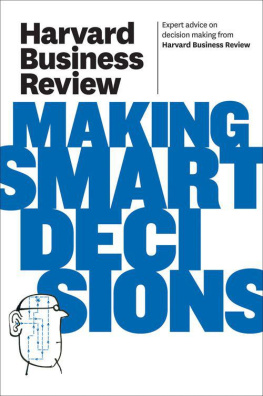Every time we watch the credits roll at the end of a movie, were always astounded by the number of people it takes to turn an idea into a complete film. Books are no different. Scores of individuals behind the scenes helped us turn a few raw ideas into a book.
Before we ever put pen to paper, our thinking was shaped by years of thought-provoking conversations about economic decision making with our colleagues and collaborators Bob Cialdini, Steve Neuberg, Jill Sundie, Norm Li, Mark Schaller, Noah Goldstein, Vaughn Becker, Andy Delton, Tess Robertson, Josh Ackerman, Jeff Simpson, Adam Cohen, Josh Tybur, Joe Redden, Jessica Li, Lani Shiota, Kristina Durante, Sarah Hill, Becca Neel, Andrew White, Jenessa Shapiro, Chad Mortensen, and Lionel Nicastle. Each of these brilliant folks helped sharpen our thinking about the topic and teach old dogs some new tricks. We are likewise indebted to our colleagues and students at Arizona State University and the University of Minnesota, who both supported and challenged us, preventing us from getting lazy and forcing us to think harder.
Our thinking about the evolutionary roots of decision making was enlightened by the great work of our many brilliant and highly productive colleagues, including Martie Haselton, Leda Cosmides, John Tooby, David Buss, Martin Daly, Margo Wilson, Robert Frank, Mark van Vugt, X. T. Wang, Jon Maner, Peter Todd, Geoffrey Miller, Rob Kurzban, Athena Aktipis, Daniel Nettle, Gerd Gigerenzer, Gad Saad, Steve Gangestad, Bill von Hippel, Andreas Wilke, Bruce Ellis, Jay Belsky, Steven Pinker, Dan Barrett, Dan Fessler, Deb Lieberman, Carlos Navarrete, and A. J. Figueredo. Your creative work inspired many fruitful ideas.
Although we have spent most of our writing careers working on scientific journal articles, both of us were inspired to branch out after taking a graduate seminar in scientific writing taught by one of our favorite science writers, John Alcock. Your reading experience throughout this book has been thoroughly improved not only by his teachings but by multiple colleagues and friends who read various versions of this book and provided detailed feedback, including Josh Ackerman, Mark Bergen, Robert Cialdini, Andy Delton, Kristina Durante, Sarah Hill, George John, Akshay Rao, Joe Redden, Jeff Simpson, David Lundberg Kenrick, Geoffrey Miller, Josh Tybur, Kevin Upton, Bram Van den Bergh, Kathleen Vohs, Jianfeng Yu, and Dong Zee. We are also thankful to several doctorate students who provided insightful feedback on the book, including Stephanie Cantu, Michael Covey, Chiraag Mittal, Nick Olson, and Ethan Young.
Dougs thinking about evolution and behavior was powerfully influenced by years of fascinating conversations with his friends Rich Keefe, Ed Sadalla, and Mark Schaller, often conducted during long walks or delicious meals. Speaking of delicious meals, Carol Luce not only provided five-star sustenance while Doug was working on this book, but also accompanied that fine cuisine with insightful intellectual nourishment and various tips for cooking and preparing the ideas presented in these pages. David Lundberg Kenrick has not only become Dougs other intellectual companion but has also used his extensive video-production skills to help bring some of these ideas to cinematic life (as you can see if you search on YouTube for How Mating and Self-Protection Motives Alter Loss Aversion or KenrickThe Rational Animal). Daves younger brother, Liam, helped Doug learn about J. K. Rowling by encouraging him to carefully read all the Harry Potter books, which also helped ameliorate any inclination to write in the style of a scientific journal article. Grandma Jean Luce also found other things to entertain Liam, generously freeing Doug up to write anything at all.
Vlad is indebted to Elliot Aronson and Anthony Pratkanis for inspiring him to pursue social psychology and to Bob Cialdini and Doug Kenrick (before he was a coauthor) for teaching him how to think both inside and outside the box. Vlads parents, Antanas and Danute, gave him the invaluable gifts of opportunity and trust, providing him the opportunity to pursue whatever he wanted, while always trusting that he would figure things out. And big brother Agnius encouraged him to boldly explore the universe of ideas. Vlad is also appreciative for years of friendship with Gil Koresh, Paul Zahka, Anuranjan Singh, Brennan Diamond, Darren Weiss, Taylor Umlauf, and Josh Sorkin, who provided companionship and many life lessons during road trips, spring-training games, and garage-band practices. Particular thanks to Gil, who was always there for a walk and a deep conversation. Vlad hopes to continue those deep conversations with his growing kids, Greta, Nora, and Nicholas, who constantly provide a new life perspective and a reminder to take joy in lifes little things. Speaking of the kids, Nana Charynanne provided endless hours of much-appreciated loving care. And, of course, Vlad is deeply indebted and thankful to his loving and devoted wife, Jenny, who selflessly does countless things every day that enable him to keep his sanity and provide him time to write. I love you.
Both Doug and Vlad are also deeply grateful to our supportive editor, T. J. Kelleher; our production editor, Sandra Beris; and our agent, Jim Levine.
J OSEPH P ATRICK K ENNEDY was a shining example of a rational economic man. At age twenty-five, he became Americas youngest bank president, bragging to a newspaper reporter, I want to be a millionaire by the age of thirty-five. That was quite an aspiration in 1915, when the average yearly income was barely $1,000, and a loaf of bread cost nine cents. Kennedy made good on his lofty goal, though, becoming a Wall Street trader and turning a profit of $650,000 on a single transaction in 1922. Kennedys good fortunes continued even when the stock market took its infamous nosedive (he had sold off his holdings just in time). His impeccable sense of timing struck again in 1933, when he arranged a lucrative contract with Dewars to import liquor into the United Statesjust as Prohibition was about to end. And as the Hollywood movie industry was hitting the big time, he co-founded RKO pictures, with assets of over $80 million.
Joe Kennedy also exhibited keen rational self-interest in his personal life. After having an affair with the beautiful movie star Gloria Swanson, he jilted the actress when her movie went grossly over budget, and left her holding the tab. Later in life, he turned his ambitions from money to political power, becoming the American ambassador to England and plotting to have his eldest son become president of the United States.
But the luck of this particular Irishman did not pass on to his descendants. His handsome and charming eldest son, Joseph Jr., the one he hoped would someday become president, was killed at age twenty-nine during a World War II bombing mission. His beautiful daughter Kathleen seemed to be living a charmed life when she married William Cavendish, heir to the Duke of Devonshire. But she was widowed only four months later when Cavendish was killed in action; then she herself died in a plane crash in 1948. Josephs second son, John, was elected president, then famously assassinated in Dallas on November 22, 1963. His third son, Robert, was shot down during his own campaign for the presidency in 1968. And his youngest son, Teddy, narrowly escaped death in 1969 when he drove his car off a bridge on Chappaquiddick Island, drowning his passenger, Mary Jo Kopechne.






